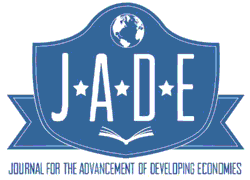Institute for the Advancement of Developing Economies

Journal for the Advancement of Developing Economies
Date of this Version
2021
Document Type
Article
Citation
Journal for the Advancement of Developing Economies 2021 Volume 10 Issue 1, pp. 15-36.
doi 10.32873/unl.dc.jade1012
Abstract
Developing countries have adopted various development strategies such as import substitution industrialization (ISI) and export promotion strategies. For Latin-American and developing countries, some level of economic growth was experienced using ISI after the Second World War. However, these countries could not attain the needed economic growth, technological advancement or guarantee food security with the adoption of ISI. It led to unequal income distribution, less internal competition, and distortions of their economy, among others. The rise of export promotion strategies in the 1970s was evidenced by an impressive economic growth and a decline in poverty in jurisdictions like Taiwan, Tanzania and among the Asian Tigers. The aim of this paper is to analyze the rationale behind the adoption of export promotion strategy vis-à-vis its application, successes, and failures in some selected Southeast Asian Countries. Furthermore, the world is currently faced with COVID-19 pandemic, a dire health crisis having economic implications across the globe. This crisis has triggered countries including selected Southeast Asian economies to develop new strategies. Using literature, this paper argues that Ghana can improve its export promotion strategy by drawing lessons from these Southeast Asian countries pre and during the COVID-19 era.
Included in
Econometrics Commons, Growth and Development Commons, International Economics Commons, Political Economy Commons, Public Economics Commons, Regional Economics Commons


Comments
Copyright © 2021 Institute for the Advancement of Developing Economies